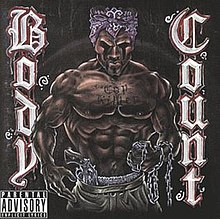| Body Count | ||||
|---|---|---|---|---|
 | ||||
| Studio album by | ||||
| Released | March 10, 1992 | |||
| Recorded | September–December 1991 | |||
| Studio | One-on-One Recorders, Syndicate Studio West (North Hollywood, California) | |||
| Genre | ||||
| Length | 52:59 | |||
| Label | Sire | |||
| Producer | ||||
| Body Count chronology | ||||
| ||||
| Singles from Body Count | ||||
| ||||
Body Count is the debut studio album by American heavy metal band Body Count, released on March 10, 1992,[3] by Sire Records. The album's material focuses on various social and political issues ranging from police brutality to drug abuse. It also presents a turning point in the career of Ice-T, who co-wrote the album's songs with lead guitarist Ernie C and performed as the band's lead singer. Previously known only as a rapper, Ice-T's work with the band helped establish a crossover audience with rock music fans. The album produced the single "There Goes the Neighborhood".[4]
Body Count is well known for the inclusion of the controversial song "Cop Killer", which was the subject of much criticism from various political figures, although many defended the song on the basis of the group's right to freedom of speech. Ice-T eventually chose to remove the song from the album,[5] although it continues to be performed live. It was voted the 31st best album of the year in The Village Voice's Pazz & Jop critics poll,[6] and is believed to have helped pave the way for the mainstream success of the rap metal genre.[7][8]
- ^ Patrin, Nate (June 9, 2020). Bring That Beat Back: How Sampling Built Hip-Hop. U of Minnesota Press. ISBN 978-1-4529-6380-8.
'Cop Killer' and the Body Count album were Ice-T's foray into crossover thrash metal
- ^ Reeves, Mosi (May 6, 2020). "THE UNKILLABLE BODY COUNT: INSIDE ICE-T'S RELENTLESS 'GRINDHOUSE' METAL BAND". Revolver.
Slowly but surely, the group developed what arguably became the first rap-metal album.
- ^ Cite error: The named reference
AMGwas invoked but never defined (see the help page). - ^ Strong, Martin Charles (2002). The Great Rock Discography (7th ed.). Canongate. pp. 724–725. ISBN 1-84195-615-5.
- ^ Ice T; Sigmund, Heidi (1994). The Ice Opinion: Who Gives a Fuck?. St. Martin's Press. pp. 99–101, 108, 166–180. ISBN 0-312-10486-3.
- ^ "The 40 Best Albums Of 1992". The Village Voice. March 2, 1993.
- ^ Devenish, Colin (August 19, 2004). "Body Count Guitarist Dead". Rolling Stone. Archived from the original on October 13, 2007. Retrieved October 20, 2007.
- ^ Freydkin, Donna (October 27, 1999). "No thaw for rapper Ice T". CNN. Retrieved October 20, 2007.